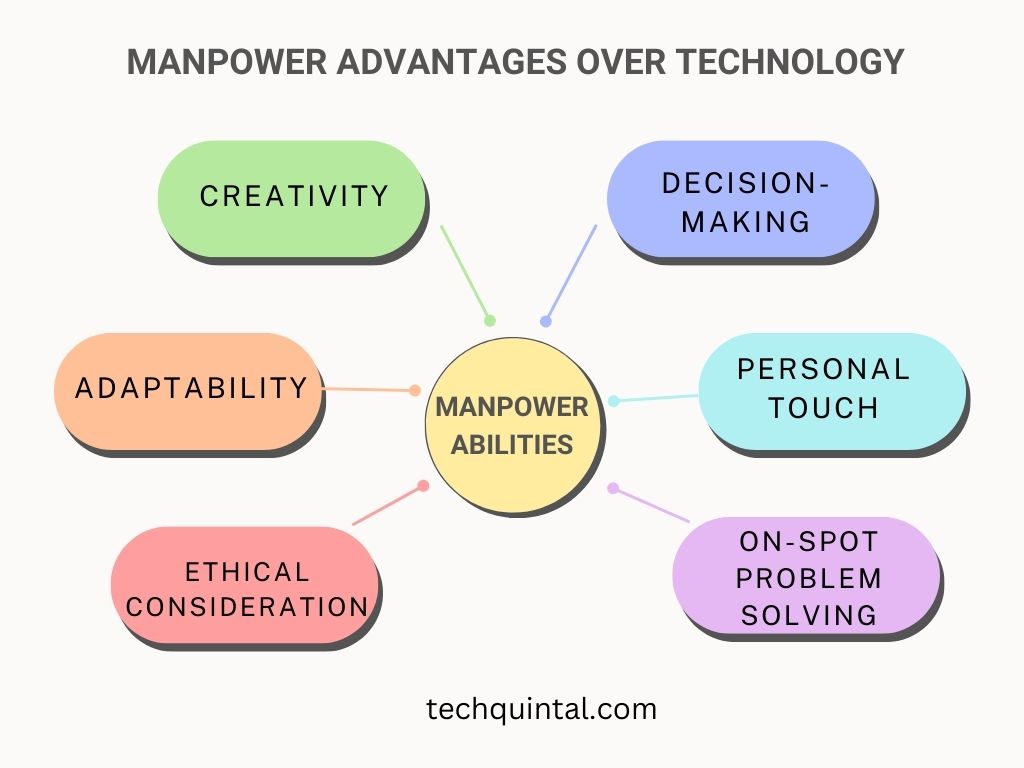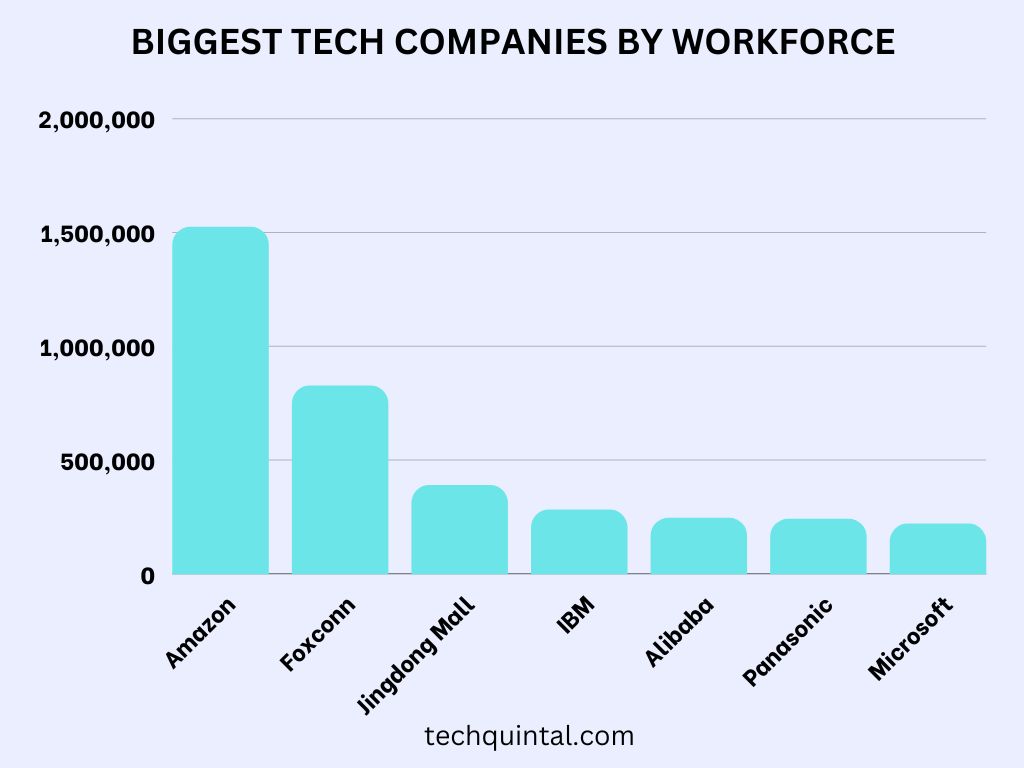
If you are a techie, your first instinct is to shrug off this very comparison. But this time, let’s not be too quick to judge. There has been an assumption that has gained popularity. The assumption is that eventually, technology will replace manpower. In fact, there is quite a lot of debate on this topic. You might have heard about it too. In reality, this is not even near to the truth. Surely, we have implemented automation, but it doesn’t imply that manpower will become obsolete.
In the end, it’s the humans inventing and maintaining the technology. The innovation and creativity elements are brought by the human minds, which when implemented through technology allows us to improve the efficiency of the system. This increases overall productivity and improves the quality of our lives. Thus, in this study, let us look at the comparison of technology and manpower minutely.
What is Manpower?
Manpower is all about using human effort and the workforce to get work done and accomplish tasks. If a job is getting done using the mental or physical ability of a human, it comes under Manpower. Manpower has been the source for performing jobs, creating goods, and providing services for thousands of years. It has been the heart of every sector, such as agriculture, construction, etc.
These days, it always gets compared to technology, and often questioned if it is still needed. But, the reason why Manpower gets a little edge over technology is due to the creativity, decision-making, and adaptability it brings to the table. A personal touch is also needed in many jobs that machines cannot provide yet.
What is Technology?
Technology is all about using tools, machines, and systems to accomplish tasks and solve problems. It includes all the machines, computers, smartphones, medical equipment, etc. Technology is quickly replacing Manpower in many sectors as it takes less time to perform tasks than humans. It is also capable of doing work in a more efficient way when trained properly.
We use technology everywhere these days. We might even find it harder to survive if do not get access to our phones, computers, and other daily gadgets. We are actively using technology to communicate, learn, work, and consume entertainment. The best thing about technology is how quickly it evolves and gets better with time. It is constantly getting improved to simplify tasks and reduce the need for Manpower.
Importance of technology
Technology allows the monitoring of real-time information. This helps detect threats in advance and resolve issues as soon as they arise. Along with improving business resiliency, technology helps to use the resources optimally. The redundant tasks are assigned to the monitoring tools.
Therefore, the employees have more time in hand to participate in the innovation process. This results in increased productivity and improved efficiency.
Significance of manpower
Businesses need manpower to continue their operations. No doubt, technology can be used instead. But manpower brings a personal touch to the work environment. The businesses manage customers who prefer interacting with the human agent over bots.
This was revealed in the survey conducted by CGS (Computer Generated Solutions, Inc). Bringing technology increases accuracy, but customers prefer human interaction more.

How technology fares vs manpower
There is tremendous pressure on various industries to heavily invest in research and development. That’s how they are aiming at developing technical solutions to keep up with the pace. In fact, more and more companies are focusing on implementing new technologies. This in no way suggests that it would reduce the demand for manpower.

Instead, there will be an increase in demand for professionals with technical skill sets and capabilities. Despite the technological revolution, not every sector can rely completely on either technology or manpower. To understand this, let’s look at the comparison in the context of different sectors.
Manufacturing
In the manufacturing industry, advanced technologies such as IoT (Internet of Things), AI (Artificial Intelligence), Big Data, and VR (Virtual Reality) are implemented to streamline processes and reduce operational costs. They introduce automation and robotics to increase productivity.
Manpower in the manufacturing industry brings real-life experiences, too. This is to say, the same situation in different contexts requires a varying set of actions. Additionally, manpower knows which actions to perform in that situation. Unquestionably, technology can analyze data, but we need manpower to solve the problems with critical thinking.
But again, implementing automation will allow manpower to get ample time for bringing innovation, creativity, and divergence.
Healthcare
Technologies such as 3D printing, nanotechnology, robotics, AI, VR, and AR in health care are aiming to help people live healthily. Then there is wearable technology empowering patients to take better care of themselves.
The implementation of nanotechnology focuses on precise drug delivery systems and cancer treatment. With more advancement, technology will help healthcare to provide treatment in a patient-friendly manner, improving the quality of care.
Technology teaches itself with trial and error, but there is no scope for this in the healthcare industry. Firstly, it is a matter of life and death we are dealing with. Secondly, technology has yet to prove itself when it comes to decision-making. A genuine connection is established between the patients and healthcare professionals that cannot be seen with technology. Therefore, manpower is essential in healthcare to work in favor of patients’ best interests.
Retail
Technology in retail helps businesses to stay ahead of the competition. It is incorporated into various processes including consumer behavior analysis, inventory tracking, data warehousing, and customer service. This helps to streamline the work while making the information readily available. The timely customer responses are one of the benefits of technology that helps increase customer satisfaction drastically.
In our human language, the meaning of the same words can change with the tone of voice and context in which it is used. It’s natural for manpower to understand customers’ concerns and assist them in such situations.
Unfortunately, technology cannot differentiate situations from the tone of voice and body language. Moreover, when technology is utilized for facial recognition, it raises privacy concerns. Ergo, we need manpower in the retail industry to build a human connection with customers.
Education
Technology is becoming an essential part of the learning process. Firstly, it increases accessibility while incorporating different learning styles.
Consequently, it improves the quality of education delivered. Some students have a short attention span, where technology such as AI and VR can be used to create innovative and creative lesson plans. That way, the students won’t get bored, feeling they are obliged to study. Instead, it will improve their learning experience significantly.
In education, the interaction between students and teachers is crucial. Technology cannot replace manpower in social interaction. This is true, at least for now. Thus, we need humans to provide a rewarding experience in education. Relying totally on humans or technology can turn out to be disastrous. However, both can work hand in hand to improve our education system.
This can be achieved in the form of assistant teaching robots helping the teachers, instead of just replacing them.
Security
Technology has been making its mark in almost every sector. In the security sector, it allows the reduction of security staff. We do not need multiple eyes of humans to keep things in check. With technology, we only need to install multiple cameras at places and then have one security member keep an eye on the real-time footage. With technology, a single person has access to alarms, footage, speakers, etc.
Now you might wonder, is there still a drawback to this? Well, there are some issues with technology that make us believe we still cannot rely on it completely. The first thing is power outrage. All the cameras and other systems need electricity and power to stay alive. Without power, all the gadgets become useless. If the power outage is serious, it can take even days to get it back.
Also, if something bad happens, humans have the capability to fix that instantly, which is not at all the case with gadgets. They cannot operate on their own. It might change with time as there will be advanced robots that might handle real-time situations like humans, but that time is still far away.
- Efficiency: Technology can monitor multiple places at once, increasing the efficiency of security protocols.
- Cost-effective: Reduces the need for a large number of security staff, hence saving on labor costs.
- Precision: Advanced technologies can identify threats with higher accuracy and precision.
Drawbacks of Relying Solely on Technology:
- Power Dependency: Technology is dependent on electricity; a power outage can incapacitate security systems.
- Lack of Immediate Response: In case of an emergency, technology may not always provide an immediate on-ground response.
- Maintenance Needs: Regular maintenance and updates are required to keep the technology effective.
Here is a table that shows the role of technology and manpower in various sectors:
| Sector | Role of Manpower | Role of Technology | Future Outlook |
|---|---|---|---|
| Healthcare | Physicians, nurses, and care providers. | Diagnostic equipment, telemedicine, AI in diagnostics. | Integration of AI for precision medicine, and human touch remains crucial. |
| Construction | Laborers, architects, project managers. | Automation in design, 3D printing. | Blended workforce with robots and humans for efficiency. |
| Retail | Salespersons, customer service representatives. | E-commerce platforms, automated checkout. | More AI-driven services, but a human touch for a premium experience. |
| Education | Teachers, administrators. | E-learning platforms, AI tutors. | Hybrid learning with technology and human interaction. |
| Agriculture | Farmers, laborers. | Drones, automated tractors. | Technology for precision farming, humans for decision-making. |
Ponder the manpower vs technology debate
Now that we have come to an end, we would like to part ways by giving you food for thought. Do you think technology can survive without manpower or vice-versa? If yes, what would the future look like? Is the projected future worth pursuing over the ones where manpower and technology work hand in hand to create a better place for us to live? You can go ahead and ponder these questions to explore the topic further.